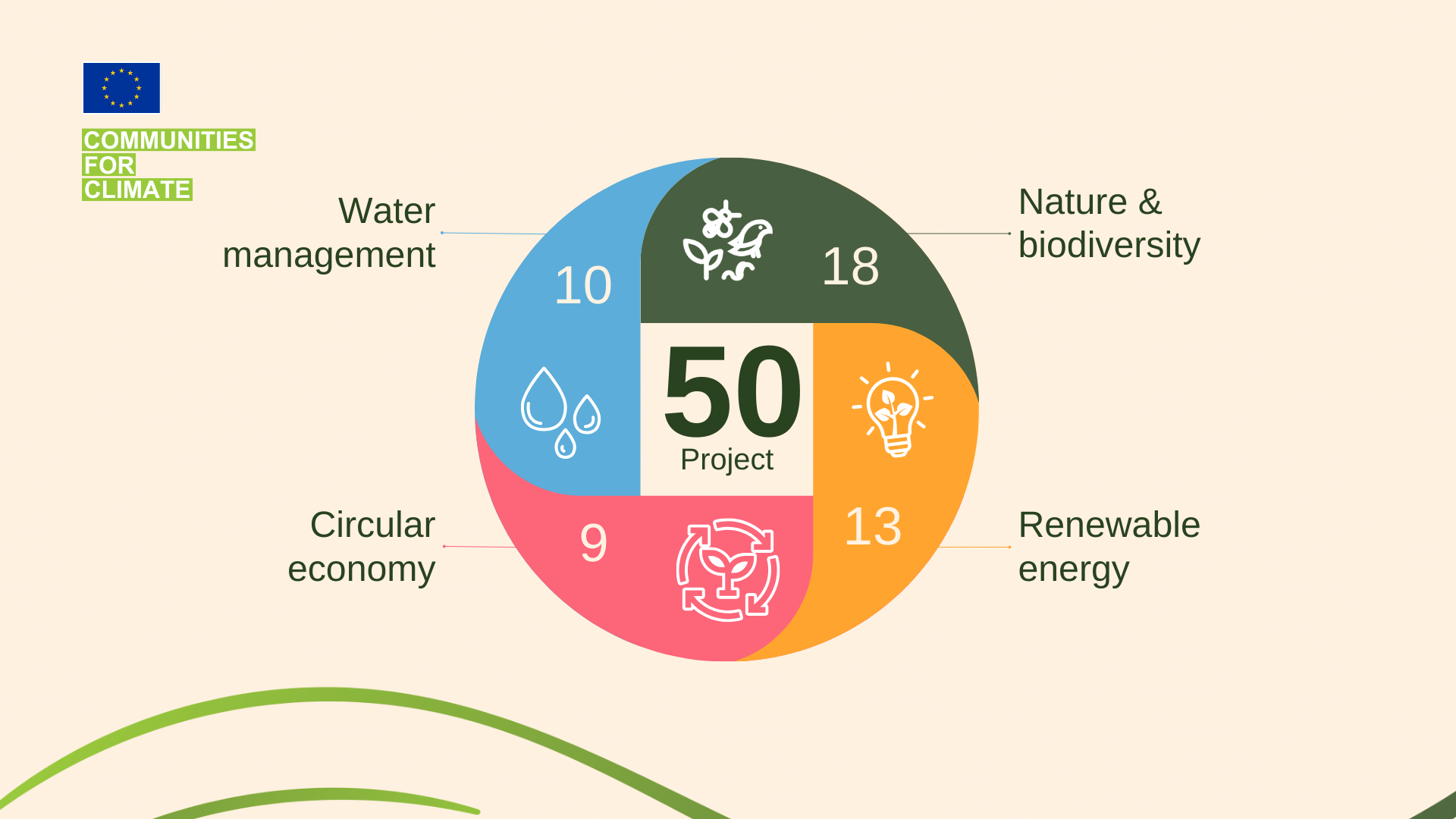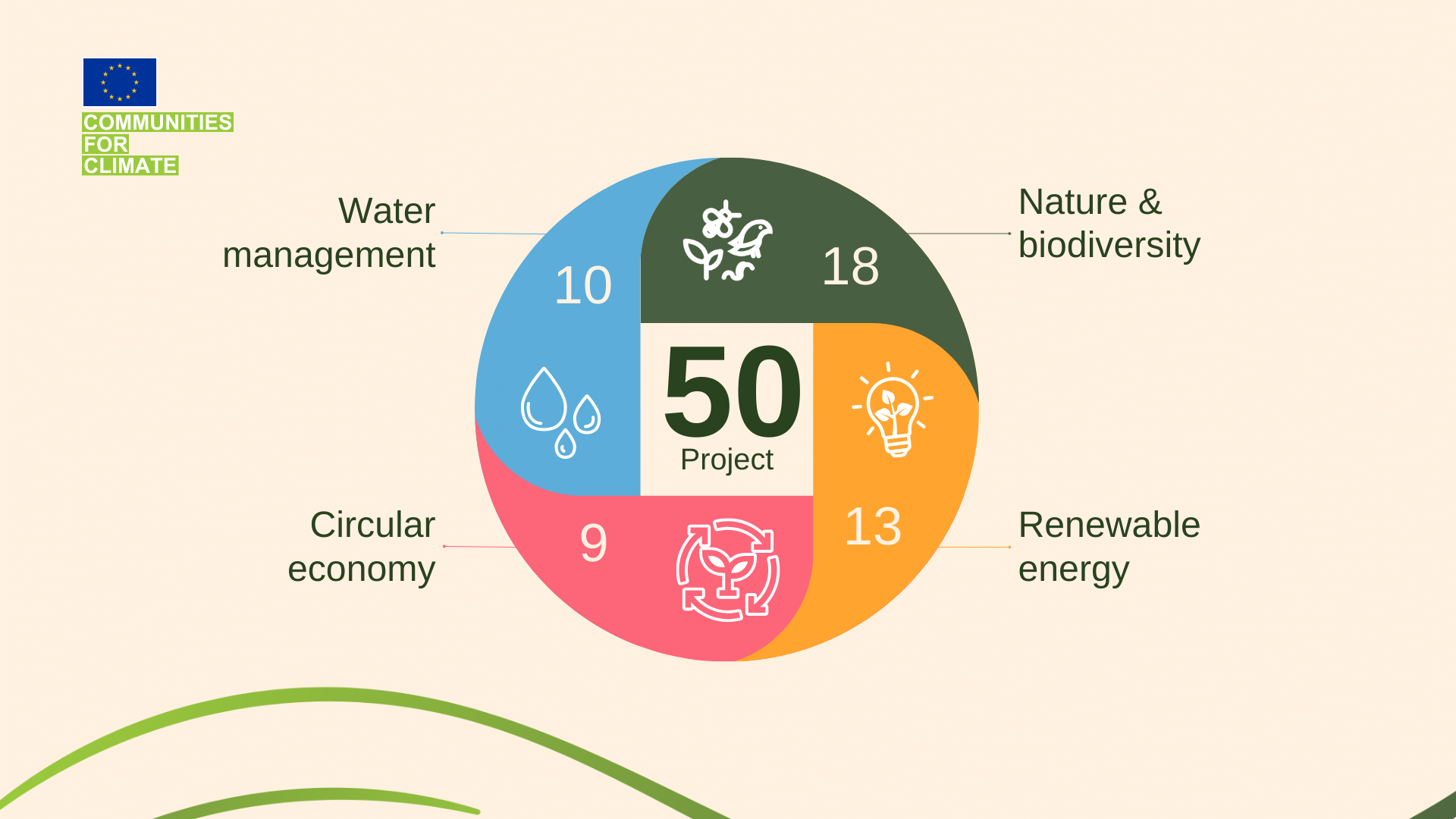The 50 projects selected for support under the Communities for Climate (C4C) initiative have been announced. With a focus on regenerating biodiversity, circular economies, renewable energy and water resource management, C4C will kick-start the groundwork with local communities in the coming weeks.
50 local projects selected for support under the Communities for Climate initiative
- 13 June 2024

The increasing impact of climate change and the recent energy crisis have made the transition to a green economy more urgent than ever. Reducing greenhouse gas (GHG) emissions is now a priority for policymakers at all levels and for local communities. There is a need and a rationale for actions closer to citizens. Local involvement in climate action is crucial to combating the apathy and mental health issues stemming from the perception of climate change as inevitable and threatening the future.
To this end, in cooperation with the Climate Pact Ambassadors initiative, the European Commission has launched the Communities for Climate (C4C) pilot action. This initiative will support 50 Communities for Climate encouraging them to engage in citizen’s climate actions, to develop and implement innovative ideas for more sustainable and resilient neighbourhoods.
C4C projects focus on regenerating biodiversity, circular economies, renewable energy and water resource management. They also contribute to the European Union’s broader climate and environmental goals, aligned with its objective of becoming climate-neutral by 2050. Communities for Climate propose replicable and impactful climate solutions to inspire other local communities across the EU.
The 50 projects are located in Croatia, Estonia, Finland, France, Germany, Hungary, Italy, Poland, Romania, Spain and Sweden, and will benefit from C4C’s specialised expertise, peer-learning opportunities, and guidance to maximise their impact.
Since climate issues know no borders, the C4C initiative will also support cross-border communities, considering their complex environments. From projects across the Italian-Slovenian border to exchanges between Spain and France and collaborations between Hungary and Romania, C4C will foster cross-border community-building and ensure that inspiring and innovative solutions, best practices and valuable lessons are shared among the selected communities and beyond.

Selected projects at a glance
Nature and biodiversity
One supported project will transform a historic building into an urban relic, where members share an open space for art, culture, and neighborly interaction, uniting diverse generations and social classes. Everyone is welcome to use these spaces, including the rooftop garden and the neighborhood kitchen. This innovative economic model will finance cultural spaces with green energy sales, making it a great example of urban regeneration and social commitment.
Another project’s mission is to map local water sources and biodiversity hotspots while fostering a strong community network, involving both the wisdom of elders and the curiosity of children. Additionally, it seeks to create a detailed environmental blueprint through service learning, providing a foundation for future sustainable interventions in the area.
By creating plant beds featuring native species, another project aims to highlight their traditional significance and conserve local biodiversity. In collaboration with a local museum, the community will be involved in cultivation and education, fostering a deep connection to the region's natural and cultural heritage.
Circular and resource efficient economy
One of the selected projects empowers citizens to harvest edible fruits from urban trees, collaborating with local governments and community groups. Gleaning events contribute to alleviating food waste by making use of unwanted food, and so the transformation of fruits into products like marmalade is not only useful for the climate and ensuring sustainable practices, but they also foster community engagement.
In a cross-border region, the emergence of a solidarity purchase group is connecting local farmers, producers, and consumers with the aim to promote the production and consumption of sustainable, locally sourced products. In so doing, it is strengthening community bonds across national borders.
On the topic of resource-sharing, a selected project is creating a resource bank and toolkit to help communities share tools and resources, similar to the way a library functions. This supports the setup of sharing centers, encouraging sustainable consumption and reducing waste at both neighborhood and municipal levels.
Renewable energy
One of Europe's largest cross-border energy communities focuses on producing renewable energy through community solar installations and developing an electric vehicle charging network. Driven collaboratively by local authorities, associations, SMEs and citizens, it engages locals through informative and participatory sessions.
Another energy cooperative involving citizens, SMEs, public administration, and farms aims to promote energy culture and social inclusion. The project will fund a collective solar power plant, embodying community ambition and fostering regional sustainability. Other actions include increased member outreach, school projects, support for vulnerable groups, and collaboration with other energy communities.
Community-led local development (CLLD) drives another supported project, aiming to create a Renewable Energy Community. The municipality believes that centring clean energy transitions around people is crucial for effective energy and climate solutions. By directly involving citizens directly, it plans to accelerate decarbonisation and address energy challenges such as high consumption and increased prices, especially during peak tourism seasons.
Access to water and sustainable water resource management
During droughts, increased water flow can be enabled through proper agreements, while coordinated management can help mitigate water surpluses in cases of increased raindrop. This is the idea of a selected project that aims to improve water governance in cross-border watercourses by reducing the need for high-cost pumping and enhancing cooperation between local authorities, institutions, and businesses in agriculture and nature conservation.
By exploring traditional agricultural practices like no-till farming, cover crops, and rotational grazing, one project aims to create a replicable model for regional water management. It seeks to develop a comprehensive, nature-based water retention strategy across borders, including rehabilitating wetlands, building swales, and planting buffer strips.
Through extensive community engagement and a participatory approach, another project aims to address the environmental challenges posed by an upcoming mine. It focuses on improving water quality, treating and reusing wastewater from mining operations for extensive farming and cinegetic species, and ensuring sustainable freshwater supply.
-----------------------------------------------------------------------------------------------------------------
In the coming weeks, C4C will kick-start the groundwork by introducing the appointed country and thematic experts who will guide and accompany each of the 50 local communities, offering tailored support to help elevate their projects’ impacts.
More information
Have a look at the Annex (50 selected local projects), visit the C4C website or contact Shannon Pfohman, C4C Project Manager (spf@aeidl.eu).
